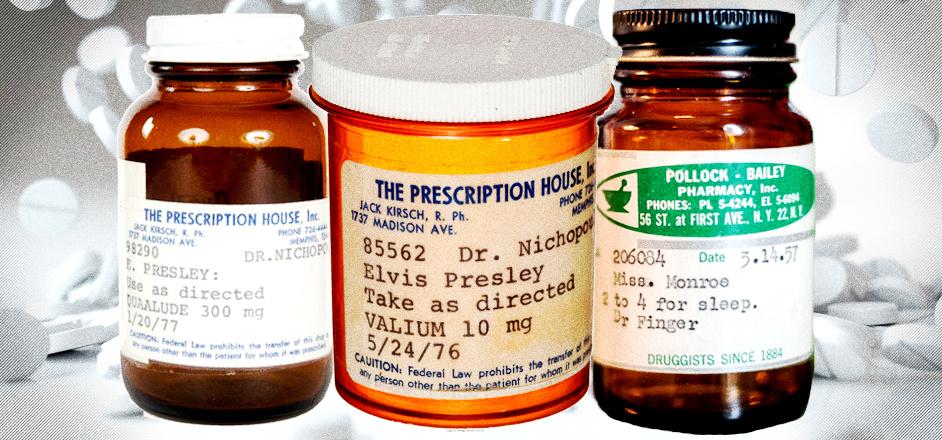Celebrity sex symbols and addiction to prescription pills are an age-old love affair. Substance abuse has destroyed the careers, the relationships, and even the lives of many beloved superstars, but tangible evidence of their drug dependence remains.
Following the death of iconic celebrities like Marilyn Monroe, Elvis Presley, and Michael Jackson, their prescription pill bottles have become buyable commodities, circulating the hands of fans and auction houses all over the country.

Marilyn Monroe’s Phenobarbital (barbiturate) prescription pill bottle, sold at Julien’s Auctions for $7,680
These containers offer an intimate look into the lives of their original owners, uncovering the chemicals that coursed through their veins, often to the extent of overdose. In these cases, possessing a keepsake of the poison that killed these American icons provides the ultimate insight into their fatal struggles. Buying a bottle of the barbiturates that killed Marilyn Monroe, for example, is comparable to acquiring Kurt Cobain’s shotgun.
“People see prescription pill bottles as a way to profoundly connect with the celebrities they respect,” Margaret Barrett, director of entertainment memorabilia at Heritage Auctions in Dallas, TX, tells The Rooster. For the past 25 years, Barrett has auctioned off the prescription containers of famous pill-poppers such as John Wayne, Elvis Presley, Marilyn Monroe, Truman Capote, and Clark Gable. Barrett says that although the bidding ordinarily begins at about $500, offers have hit as high as $10,000 for a single prescription canister.

Elvis Presley’s Quaalude prescription pill bottle, sold at Julien’s Auctions for $8,320
This expensive price tag is especially surprising if you take into consideration that the bottles are entirely empty. Re-selling the intoxicating meds would be illegal, so buyers must invest in strictly the container.
Barrett, on the other hand, was gifted two of Truman Capote’s bottles, both filled to the brim with barbiturates. She puts them on display on a shelf in her home, although visitors will avert their eyes from the vials so as not to seem intrusive.

Truman Capote’s personal prescriptions rest on Margaret Barrett’s shelf
“Prescriptions are so private and personal,” Barrett explains, “that you can’t help but look at the labels. It’s a natural reaction to wonder: What’s inside? What disease did he have? Why did he need that drug?” Our innate curiosity is a little invasive and very intimate, Barrett believes, but that’s part of the prescriptions’ appeal.
The retailers at Julien’s Auctions in Los Angeles, CA, have also sold a number of famous pharmaceutical containers. Over the past several years, they’ve boasted bottles of Michael Jackson’s pain relievers, an array of Truman Capote’s prescriptions, and Marilyn Monroe’s barbiturates, all of which were found in the respective celebrity’s systems at their time of death.
The merchants amass their empty bottles from various sources, Barrett tells us, including the star’s friends, family members, or managers. Yet increasingly often, the souvenirs come from dumpster divers, who root through celebrities’ garbage bins in hopes of finding intimate mementos like medicine canisters and flipping them for a profit. Unfortunately, this practice has become so rampant that living celebrities must take precautions to protect themselves, removing any labels or entirely destroying their depleted prescription containers.

Elvis Presley’s Valium prescription pill bottle, sold at Heritage Auctions for $4,062
Prying eyes are a predictable consequence, however, now that proof of public figures’ drug abuse has become a shareable commodity. Admittedly, owning an eternal token of our celebrities’ addictions is compelling, but it comes at a cost. As the market for these medicine bottles advances, a societal epidemic of invasiveness spreads.
For this American sickness of neglected privacy, we prescribe 100 mg of Anti-Intrude, to be taken morning, afternoon, and night. Don’t forget to destroy your container upon completion.



Leave a Reply